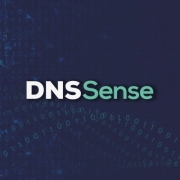Domain Name System (DNS) Security is crucial for protecting the integrity and availability of DNS infrastructure. It helps prevent attacks such as DNS spoofing, cache poisoning, and other threats targeting DNS vulnerabilities.
As organizations rely heavily on DNS for internet connectivity, ensuring the security of DNS infrastructure becomes a priority. DNS Security solutions include DNS firewalls, DNSSEC, and advanced threat protection mechanisms. These tools provide continuous monitoring, threat detection, and mitigation capabilities to safeguard DNS services from increasingly sophisticated attacks. Leveraging real user insights, best practices can be identified to fortify DNS security strategies.
What are the critical features of DNS Security solutions?In finance, DNS Security helps protect against phishing and fraud by ensuring that DNS queries are legitimate. In healthcare, it safeguards patient information by securing DNS traffic to and from healthcare networks.
Protecting DNS infrastructure is essential for organizations to maintain secure and reliable internet connectivity, safeguarding sensitive information and ensuring continuous business operations.












































Domain name system security (DNSSEC) adds a level of protection to the DNS by using two digital keys to authenticate any address retrieved by the DNS. One of the keys is held privately by the owner of the website and revealed to no one. The other key is present in the code of the web page where anyone can access it publicly. These keys attempt to verify the authenticity of a signature on the web page data that the DNS pulls up. A search for a web page prompts the DNS to retrieve and attempt to match the public key to a digital signature that stamps the data. If the key confirms that the signature is valid, then the information is returned to the person who issued the query. However, if the key is unable to verify the data as valid, then the data is rejected. The system will assume that it is under attack and will issue an error message.
The reason that domain name system security is necessary is that by itself the DNS is not secure. It is possible for hackers to manipulate the DNS and send users to any web page that they desire. An unsuspecting person can be redirected to a site which can maliciously target them. Hackers have the ability to forge DNS data and make it so that the IP address appears to be anything that they want. The computer that launches the query ordinarily would not have any way to determine the true source of the data. The development of DNSSEC created a way of securing the DNS against data forgery.
A domain name system (DNS) is an object in itself. This is a program that takes domain names and transforms it into a format that computers are able to read. It exists as its own independent entity and requires nothing else for it to be meaningful. Domain name system security (DNSSEC) is a protocol that exists as an addition to DNS. DNSSEC provides a layer of security to the DNS which is otherwise pretty insecure. For this reason, DNSSEC only has meaning when seen as an add-on to the DNS.
There are a number of benefits that come with the use of domain name system security (DNSSEC). It can:
DNS Security provides protection against various cyber threats by verifying the authenticity of DNS responses. It prevents DNS spoofing, cache poisoning, and man-in-the-middle attacks. By implementing DNSSEC, integrity and origin authentication are ensured via digital signatures. This improves trust in internet transactions and communications. DNS Security also helps mitigate distributed denial-of-service (DDoS) attacks by validating traffic. Enhanced security protocols in DNS bolster network resilience, ensuring users connect to legitimate, unaltered web resources.
DNS Security solutions deploy a variety of techniques such as DNSSEC (Domain Name System Security Extensions) which ensures authenticity and data integrity. When you use DNSSEC, it adds cryptographic signatures to DNS data. This means any unauthorized alterations can be detected and blocked, preventing attackers from redirecting you to malicious websites. Additionally, implementing DNS filtering and monitoring provides an alert system for abnormal activities, offering you an extra layer of protection against spoofing.
What role does DNS Security play in protecting against DDoS attacks?DNS Security helps mitigate DDoS attacks by implementing rate limiting, IP filtering, and anycast routing. Rate limiting prevents overwhelming your DNS servers with excessive requests, while IP filtering blocks malicious traffic. Anycast routing distributes incoming DNS queries across multiple servers, balancing the load and reducing the risk of crashing. This setup ensures that your DNS infrastructure remains operational even during a DDoS attack, maintaining uptime and performance.
How can DNS Security solutions aid in data exfiltration prevention?DNS Security solutions assist in preventing data exfiltration by monitoring DNS queries for suspicious patterns indicative of data theft attempts. By analyzing these queries and comparing them against threat intelligence, these solutions can identify and block malicious data channels. Enhanced DNS logging and analysis offer insights into unusual data transfers, allowing you to swiftly respond to and mitigate potential threats, protecting sensitive information from unauthorized access.
Why is DNSSEC crucial for modern enterprises?DNSSEC is essential for modern enterprises as it enhances DNS integrity and helps prevent cyber threats like cache poisoning and man-in-the-middle attacks. By validating DNS response authenticity, DNSSEC ensures that you are accessing legitimate internet services. This integrity is crucial for safeguarding transactions and communications. For enterprises, implementing DNSSEC builds trust with clients and partners, reducing the risk of fraud and data breaches, thereby safeguarding your brand reputation.
What is the impact of DNS tunneling in cybersecurity, and how can it be mitigated?DNS tunneling poses a significant threat as attackers can use it to covertly transmit data through DNS queries, bypassing firewalls. This technique is often used for data exfiltration and unauthorized network access. To mitigate DNS tunneling, organizations can employ deep packet inspection to analyze DNS traffic for anomalies and deploy strict access controls to limit DNS query types and frequencies. Regularly updating and patching DNS software also reduces vulnerabilities that attackers might exploit, helping you maintain a secure network environment.